A well-structured diet is crucial for competitive swimmers to optimize performance, endurance, and recovery. This plan focuses on balancing macronutrients, hydration, and timing to fuel intense training and competitions effectively.
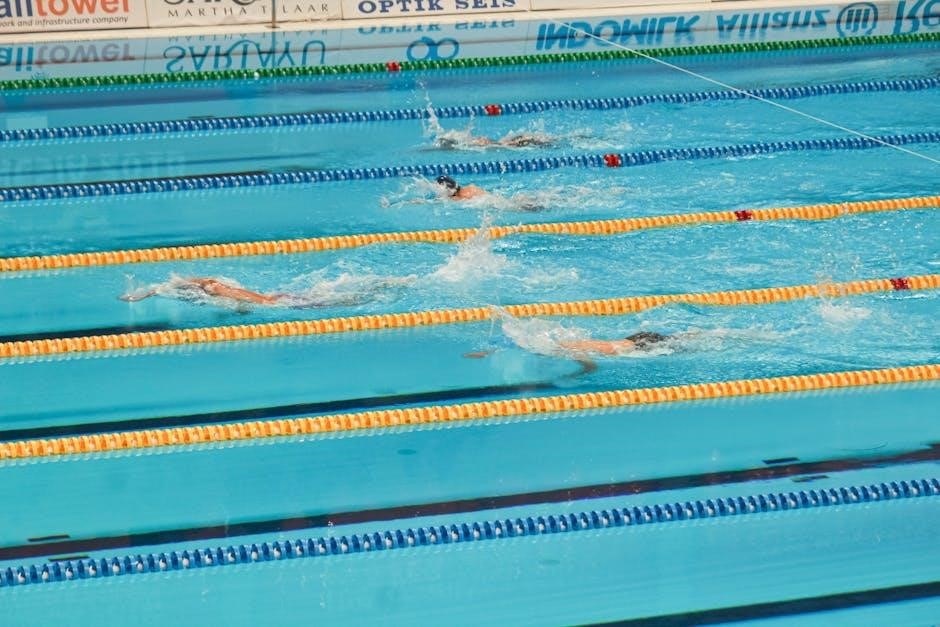
Key Principles of a Competitive Swimmers’ Diet
The diet focuses on optimizing performance and recovery, emphasizing a tailored approach, high carbohydrate intake, protein for muscle repair, hydration, and nutrient-dense foods to meet energy demands.
1.1 Energy Intake and Caloric Needs
Competitive swimmers require a high caloric intake to match their energy expenditure, typically ranging from 6,000 to 10,000 calories daily. This varies based on training volume, weight, and muscle mass. Adequate calories ensure optimal performance, recovery, and growth. Swimmers need an additional 1,000 calories per two hours of training and 60-100 calories daily for growth. Inadequate intake can lead to fatigue and poor recovery. Properly fueling the body is essential to sustain endurance and strength during rigorous sessions. A personalized approach ensures each swimmer meets their specific needs, avoiding deficits that hinder performance and overall health. Monitoring energy balance is crucial for peak athletic function.
1.2 Balanced Macronutrient Composition
A competitive swimmer’s diet should emphasize a balanced mix of carbohydrates, protein, and healthy fats to support energy needs, muscle repair, and overall health; Carbohydrates, the primary energy source, should account for 55-65% of total calories, with a focus on complex carbs like whole grains, fruits, and vegetables. Protein, essential for muscle repair and growth, should make up 15-20% of the diet, sourced from lean meats, fish, eggs, and plant-based options. Healthy fats, including omega-3s, should contribute 20-25% of calories, supporting inflammation reduction and hormone production. This balanced composition ensures sustained energy, prevents fatigue, and aids recovery, while also maintaining digestive health and immune function. Proper macronutrient ratios are vital for peak performance and long-term health.
1.3 Importance of Nutrient-Dense Foods
Nutrient-dense foods are essential for competitive swimmers, as they provide vital vitamins, minerals, and antioxidants that support optimal performance and recovery. These foods, such as lean proteins, whole grains, fruits, and vegetables, offer high nutritional value without excessive calories. They help maintain immune function, reduce inflammation, and promote overall health. Incorporating nutrient-dense options ensures swimmers meet their dietary needs while avoiding empty calories that can hinder performance. Prioritizing these foods also supports energy production, muscle repair, and mental clarity, all of which are critical for intense training and competition. A diet rich in nutrient-dense foods helps swimmers maintain peak physical condition and reduces the risk of illness or fatigue.
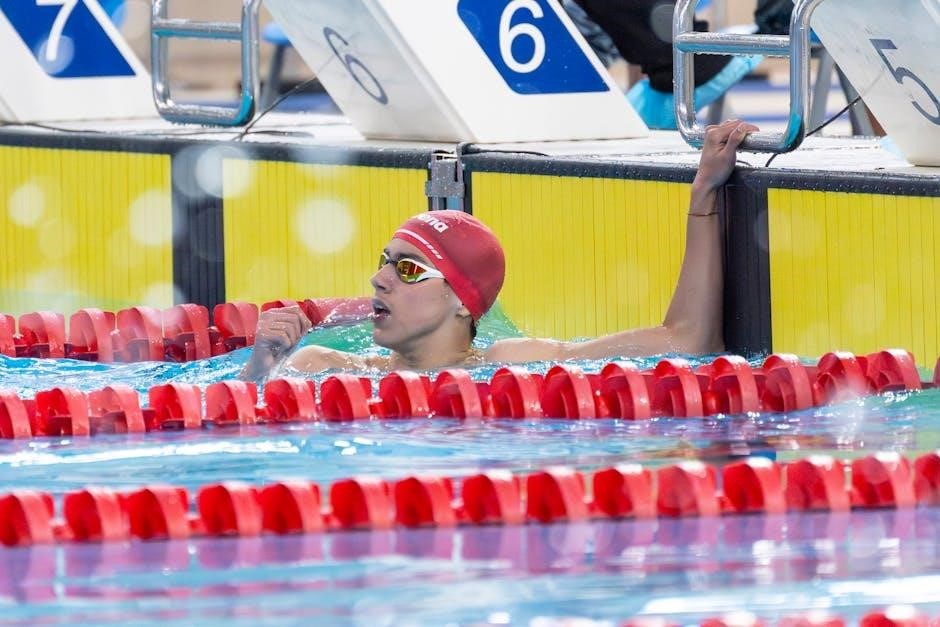
Macronutrient Breakdown for Swimmers
Swimmers require a balanced intake of carbohydrates, proteins, and fats to fuel training and recovery. Carbohydrates provide energy, proteins repair muscles, and fats support overall health.
2.1 Carbohydrates: The Primary Energy Source
Carbohydrates are the cornerstone of a swimmer’s diet, serving as the primary energy source. They are stored in muscles and liver as glycogen, which fuels intense workouts. Swimmers need 3-8 grams of carbs per kilogram of body weight daily, depending on training intensity. Complex carbs like whole grains, fruits, and starchy vegetables provide sustained energy, while simple carbs offer quick fuel during races. Proper carb intake ensures peak performance, delays fatigue, and supports recovery. A well-timed carbohydrate strategy is essential for meeting the high energy demands of competitive swimming. Balancing carb intake with other nutrients ensures optimal energy utilization and overall health.
2.2 Protein: Muscle Repair and Growth
Protein is essential for competitive swimmers, supporting muscle repair, growth, and recovery. Swimmers require 1.2-2.0 grams of protein per kilogram of body weight daily, depending on training intensity. High-quality sources include lean meats, fish, eggs, dairy, and plant-based options like legumes and tofu. Protein helps rebuild muscle tissue damaged during intense workouts, reducing soreness and improving performance. Timing is crucial; consuming protein within 30-60 minutes post-workout aids recovery. Additionally, protein contributes to satiety and helps maintain muscle mass during calorie-restricted periods. Adequate protein intake ensures swimmers can handle the physical demands of training and competition while supporting overall muscle health and function. Balancing protein with other nutrients is vital for optimal results.
2.3 Healthy Fats: Essential for Overall Health
Healthy fats are vital for competitive swimmers, supporting energy production, hormone function, and the absorption of fat-soluble vitamins. Sources like avocados, nuts, seeds, olive oil, and fatty fish provide essential fatty acids. These fats help reduce inflammation, aiding in recovery and maintaining overall health. Swimmers should aim for 20-30% of their daily calories from fats to support bodily functions and sustain energy levels during training. Incorporating healthy fats into meals ensures proper nutrient absorption and supports long-term performance. Balancing fats with carbohydrates and protein is key to optimizing a swimmer’s diet for peak health and athletic performance.
Meal Timing Strategies
Proper meal timing is crucial for swimmers to fuel training and aid recovery. Eat balanced meals 1-3 hours pre-session, light snacks 30 minutes before, and a recovery meal within an hour post-session. Stay hydrated throughout and adjust based on individual schedules and training intensity to optimize energy levels and performance.
3.1 Pre- and Post-Training Meals
Pre-training meals should be consumed 1-3 hours before practice, focusing on high-carbohydrates, moderate-protein, and low-fat foods to ensure easy digestion and sustained energy. Examples include oatmeal with fruit, whole-grain toast with peanut butter, or yogurt with granola. Post-training meals are critical for recovery, aiming to replenish energy stores and repair muscles. Within 30-60 minutes after training, swimmers should consume a mix of carbohydrates and protein, such as a banana with chocolate milk, a smoothie, or a balanced meal like grilled chicken with sweet potatoes and vegetables. Staying hydrated with water or sports drinks is also essential, both before and after sessions, to maintain performance and recovery. Proper meal timing helps optimize energy levels and supports overall training effectiveness.
3.2 Snacking Between Sessions
Snacking between training sessions is vital for maintaining energy levels and supporting recovery. Swimmers should opt for nutrient-dense, easily digestible snacks that are high in carbohydrates and moderate in protein. Examples include fruits like bananas or berries, energy bars, yogurt, or smoothies. It’s important to avoid heavy, greasy, or high-fiber foods that may cause digestive discomfort. Staying hydrated with water or electrolyte-rich drinks is also crucial. Snacks should be consumed 30-60 minutes before the next session to ensure proper fueling without discomfort. These snacks help replenish glycogen stores and prevent fatigue, allowing swimmers to perform at their best during subsequent training or competitions. A well-timed snack can significantly enhance endurance and overall performance in the water.
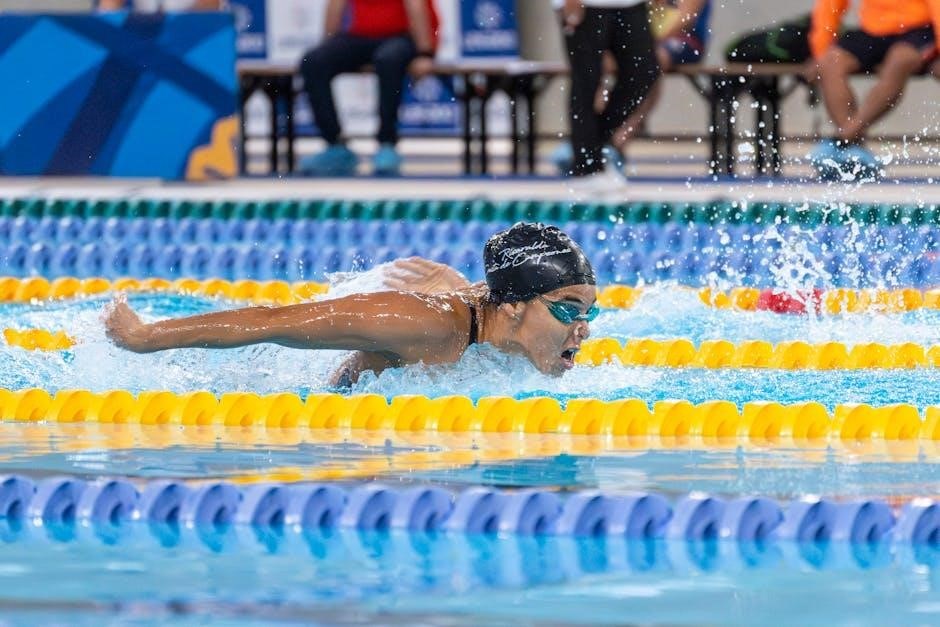
Hydration and Fluid Intake
Proper hydration is essential for competitive swimmers, as water loss through sweat can significantly impact performance. Swimmers often underestimate fluid loss due to being in the water, but dehydration can lead to fatigue, muscle cramps, and decreased endurance. Aim to drink 17-20 ounces of water 2-3 hours before training and 8-10 ounces every 10-15 minutes during sessions. Electrolytes, such as sodium and potassium, are also crucial to maintain fluid balance and prevent cramping. Including electrolyte-rich beverages or snacks, like sports drinks or coconut water, can help replenish these nutrients. Additionally, monitor urine color as a hydration indicator—pale yellow suggests proper hydration. Prioritizing hydration ensures optimal physical function and supports overall training efficiency.
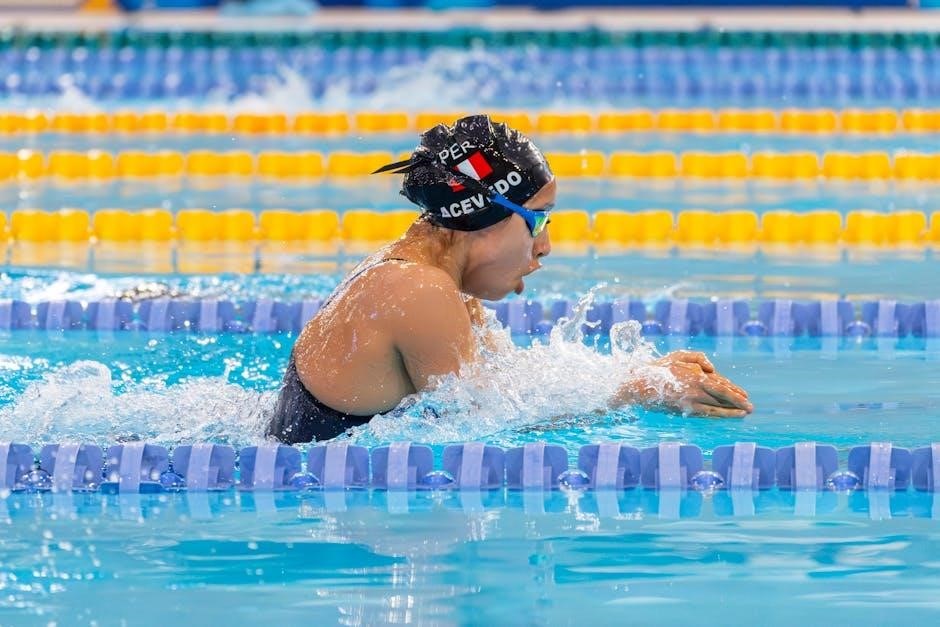
Weight Management for Competitive Swimmers
Balancing caloric intake with energy expenditure is key for swimmers. Avoid extreme diets; focus on maintaining lean muscle mass through nutrient-dense foods to support performance.
4.1 Safe Weight Loss Practices
Safe weight loss for competitive swimmers involves gradual calorie reduction without compromising performance. Aim for a deficit of 500-750 calories daily to lose 1-1.5 pounds weekly. Focus on nutrient-dense foods, lean proteins, and complex carbs to maintain energy levels. Avoid restrictive diets that may hinder recovery or strength. Incorporate high-intensity interval training to preserve lean muscle mass. Hydration and electrolyte balance are crucial during weight loss to prevent fatigue. Consult a sports dietitian to tailor strategies, ensuring optimal nutrition and performance. Regular monitoring of body composition and energy levels helps adjust the plan as needed.
4.2 Maintaining Lean Muscle Mass
Maintaining lean muscle mass is vital for competitive swimmers to sustain strength and power. A diet rich in high-quality protein (1.6-2.2g/kg/day) supports muscle repair and growth. Include lean sources like chicken, fish, and eggs, and consider plant-based options such as legumes and quinoa. Timing protein intake around training sessions helps optimize muscle synthesis. Resistance training and plyometrics complement nutrition efforts, targeting key muscle groups used in swimming. Adequate carbohydrate and healthy fat intake ensures energy availability for workouts. Monitoring progress through body composition analysis and performance metrics allows adjustments to maintain muscle mass while achieving weight goals. A balanced approach ensures swimmers stay powerful and efficient in the water.
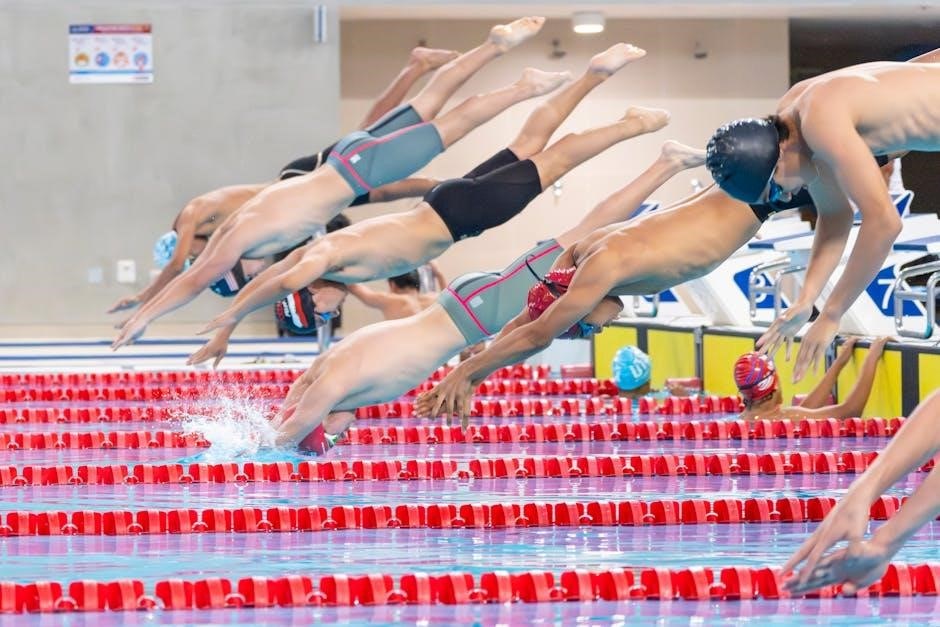
Role of Supplements in a Swimmers’ Diet
Supplements play a supportive role in a swimmer’s diet, addressing potential nutrient gaps and enhancing performance. Protein powders and creatine are popular choices to aid muscle recovery and strength. Iron supplements are often recommended for athletes with deficiencies, as iron supports oxygen transport. Omega-3 fatty acids reduce inflammation, while vitamin D and calcium maintain bone health. Electrolytes, including sodium and potassium, help replenish lost salts during intense training. However, supplements should not replace whole foods but rather complement a balanced diet. Consulting with a sports dietitian ensures safe and effective use, avoiding over-supplementation and potential interactions with medications. A tailored approach maximizes benefits, supporting swimmers’ training and competition goals.
Periodized Nutrition for Training and Competition
Periodized nutrition tailors a swimmer’s diet to specific training phases, optimizing performance and recovery. During high-intensity training, carbohydrate intake is increased to fuel endurance, while protein and fats support muscle repair. In competition phases, the focus shifts to lightweight, easily digestible meals rich in complex carbs and lean proteins to avoid gastrointestinal discomfort. Recovery phases emphasize protein and healthy fats to repair tissues and replenish energy stores. This strategic approach ensures swimmers adapt to demands, peak at critical moments, and maintain overall health. A sports dietitian can help design a periodized plan, aligning nutrition with training cycles for maximum effectiveness. This adaptive strategy is key to achieving peak performance in competitive swimming.
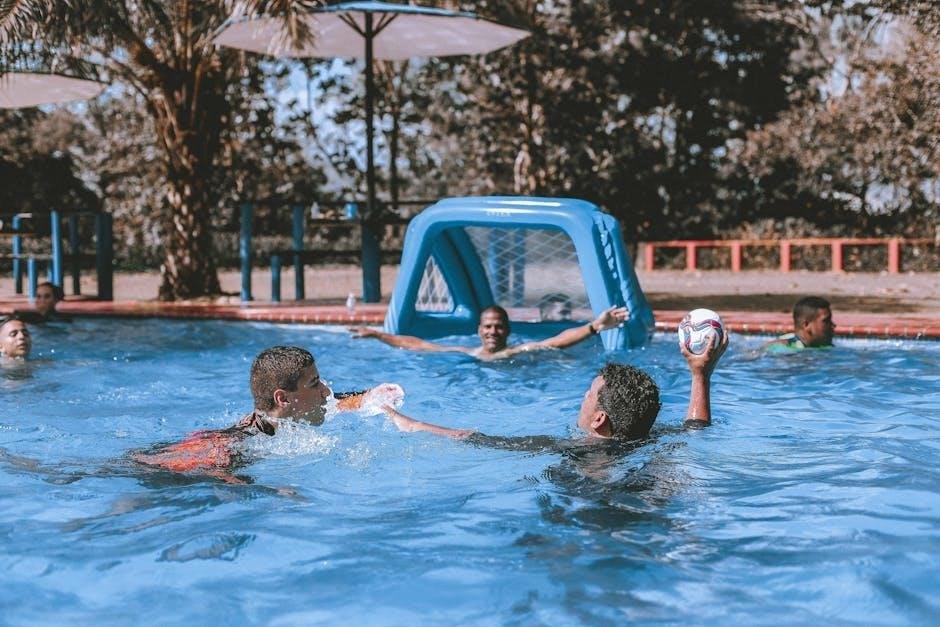
Sample 14-Day Meal Plan
This structured plan provides balanced meals with carbs, proteins, and healthy fats. Example: oatmeal for breakfast, grilled chicken with whole grains for lunch, and salmon with vegetables for dinner. Each day includes snacks like fruits and nuts, ensuring energy and recovery. The plan is customizable to meet individual needs and preferences, supporting swimmers’ high energy demands.
6.1 Daily Meal Structure and Examples
A competitive swimmer’s daily meal structure should be balanced and timed to fuel training sessions effectively. Breakfast options include oatmeal with fruits and nuts, providing sustained energy. Lunch could feature lean proteins like grilled chicken or fish, paired with complex carbs such as quinoa or brown rice, and steamed vegetables. Dinner might consist of salmon for omega-3 fatty acids, alongside sweet potatoes and a green salad. Snacks like bananas, energy bars, or Greek yogurt with honey are ideal for quick energy replenishment between sessions. Staying hydrated with water and electrolyte-rich drinks is also emphasized to prevent fatigue and maintain performance levels throughout the day. This structure ensures swimmers meet their nutritional needs for optimal performance and recovery.
6.2 Adjusting the Plan for Individual Needs
A one-size-fits-all approach doesn’t work for competitive swimmers, as individual needs vary based on training volume, body composition goals, and dietary preferences. Swimmers with higher energy expenditure may require more calories, while those aiming to lose weight should focus on nutrient-dense, lower-calorie options. Macronutrient ratios can be adjusted, such as increasing protein for muscle repair or carbs for endurance events. For example, a vegetarian swimmer might opt for plant-based proteins like beans or tofu, while a gluten-intolerant athlete could choose gluten-free grains. Hydration and electrolyte intake should also be personalized, especially for high-sweat sessions. Regularly monitoring performance and adjusting the plan with a sports dietitian ensures it meets evolving needs and supports peak performance.
Monitoring and Adjusting the Diet Plan
Regular monitoring is essential to ensure a competitive swimmer’s diet plan remains effective. Tracking metrics like energy levels, recovery, and performance provides insights into whether adjustments are needed. Swimmers should log their food intake and hydration levels, noting how their body responds. Weight, body composition, and training output are also key indicators. If an athlete feels fatigued or isn’t recovering well, it may signal a need for more carbohydrates or protein. Adjustments should be made in collaboration with a sports dietitian to maintain balance and optimize results. This continuous process ensures the diet evolves with training demands and personal needs, supporting peak performance and overall health.

Common Mistakes to Avoid in Swimmers’ Nutrition
Competitive swimmers often make nutritional errors that can hinder performance. One common mistake is insufficient carbohydrate intake, leading to low energy during training. Over-relying on processed foods and neglecting whole, nutrient-dense options is another pitfall, as it can impair recovery and overall health. Inadequate hydration is also prevalent, with swimmers failing to drink enough fluids before, during, and after sessions. Additionally, extreme calorie restriction or overconsumption can disrupt weight management and energy levels. Timing of meals is crucial, and eating too close to training or competitions can cause digestive discomfort. Avoiding these mistakes requires careful planning and awareness, ensuring swimmers fuel their bodies appropriately for optimal results.
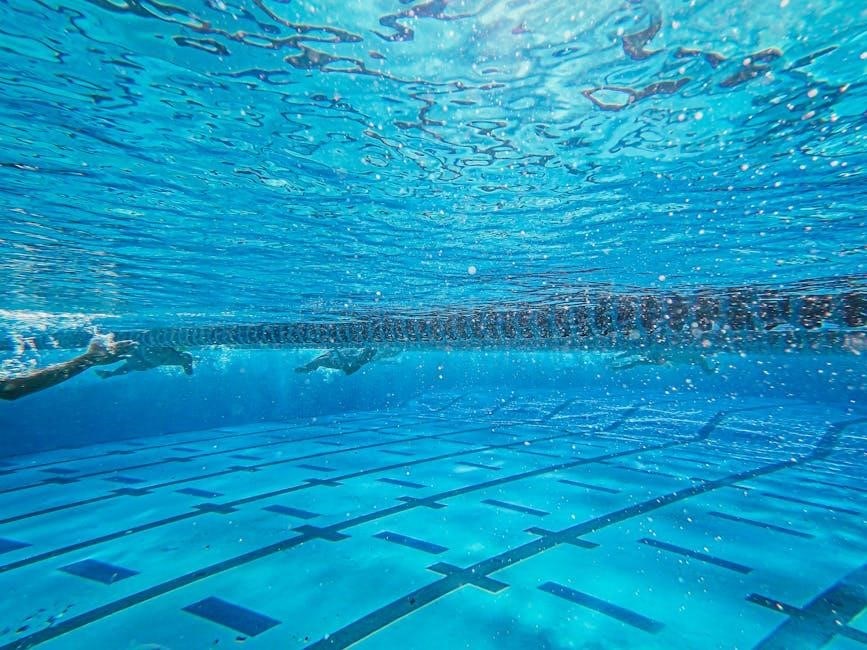
Mental Performance and Nutrition
Mental performance is closely linked to nutrition for competitive swimmers. A well-fueled brain enhances focus, motivation, and resilience during intense training and competitions. Carbohydrates are essential for maintaining blood sugar levels, which directly impact cognitive function and mood. Protein-rich foods support neurotransmitter production, while healthy fats, particularly omega-3 fatty acids, promote brain health. Additionally, staying hydrated is crucial as even mild dehydration can impair concentration and reaction times. A balanced diet not only boosts physical performance but also mental clarity and emotional stability, enabling swimmers to stay composed under pressure. Proper nutrition strategies can help swimmers maintain a competitive edge mentally, complementing their physical training.
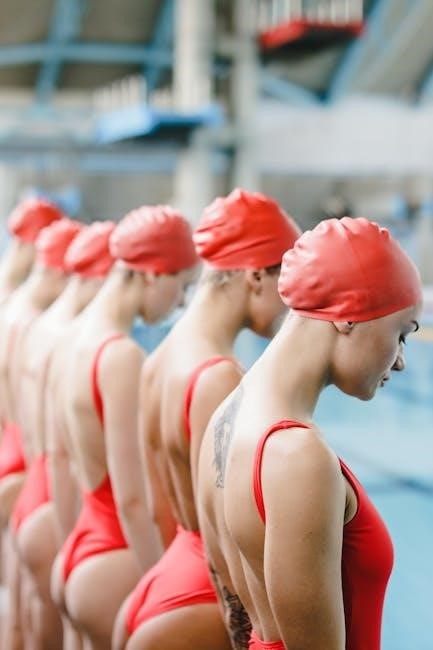
Nutrition for Recovery and Injury Prevention
Proper nutrition plays a vital role in recovery and injury prevention for competitive swimmers. After intense training, the body requires adequate nutrients to repair muscles, replenish energy stores, and reduce inflammation. Protein is essential for muscle repair, while carbohydrates help restore glycogen levels. Incorporating anti-inflammatory foods, such as berries, nuts, and leafy greens, can aid in reducing muscle soreness. Omega-3 fatty acids, found in fatty fish, also support joint health and inflammation reduction. Staying hydrated with water and electrolyte-rich beverages is crucial for muscle function and recovery. A balanced diet not only accelerates recovery but also strengthens the body, reducing the risk of injuries like tendonitis or muscle strains. Prioritizing nutrition post-training ensures swimmers can maintain consistent performance and longevity in their sport.
A competitive swimmer’s diet plan is a tailored approach to fuel performance, recovery, and overall health; By focusing on balanced macronutrients, proper hydration, and strategic meal timing, swimmers can optimize their training and competition outcomes. Personalization is key, as needs vary based on training intensity, weight goals, and individual preferences. Incorporating nutrient-dense foods, avoiding fad diets, and seeking professional guidance ensures a sustainable and effective plan. Monitoring progress and adjusting the diet as needed helps maintain peak performance. Remember, consistency and patience are vital—small, incremental changes can lead to significant improvements over time. Prioritize quality nutrition to unlock your full potential in the water.
